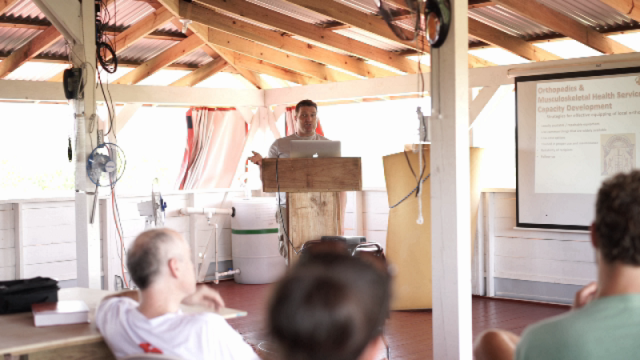
by Dr. Ben LaBrot, founder of Floating Doctors
Recently, while visiting the US, I went to the emergency room with a family member who was suffering some generalized complaints (chest and abdominal pain).
Very soon after we got checked in, the attending physician ordered a litany of tests—a complete blood count with differential, blood clot tests (d-dimer), ESR and CRP, a metabolic panel, a liver panel, blood cultures, urinalysis, chest X-ray, ECG, abdominal ultrasound, and a medical and a surgical review.
I immediately felt the challenge of practicing in a resource-limited setting weighing heavily on my mind.
What a luxury it is to simply show up at an ER within easy driving distance of home, and to have such a vast array of diagnostics, pretty much on tap.
In the remote areas where Floating Doctors practices, we are faced with two major challenges related to medical testing.
- Firstly, there’s cost: sometimes the only option is to pay to have them done privately for our patients, which can very quickly add up to enormous per-patient costs. This can be a limiting factor in how much advance care we are able to coordinate for our patients, who otherwise have very little real access to these services.
- Second, there’s logistics: Besides the cost in time and travel expenses and the challenge of organizing it all without cell service, patients from very remote regions may be understandably intimidated by travelling across the country to urban centers for tests. They may not speak Spanish; some only speak their indigenous dialect, and they may face discrimination as well. They may be robbed or taken advantage of during a long solo trip, or sexually assaulted. And worst of all, a wide range of tests that we casually obtained in the ER might involve multiple visits to different cities in various parts of the country. That means plenty of long travel from remote regions, arranging child care for their families while away. These situations are not practical for every patient with chest/abdominal pain that we encounter in our Floating Doctors practice.
When working in remote villages that may or may not have access to electricity, we need techniques that avoid applying the medical tests that we have to arrange for our patients, and we rely heavily what we call the “diagnostic trifecta,” to prioritize what exams to organize:
- Thorough medical history & physical exam
- Telemedicine consultation
- Ultrasound
I’m reminded of a typical (too typical) case that Floating Doctors saw in Panama; a young baby that was underweight and failing to thrive. A thorough history and physical exam did not reveal any obvious source of problem, and before we submitted the case to our telemedicine service for advice, we performed an ultrasound.
Being able to categorically confirm that the heart, kidneys, liver, and spleen all appeared normal immediately slashed the number of possible exams that we would need to prioritize. The decision was made to closely watch and support the mom and baby. Fortunately, the baby began to thrive with more aggressive feeding encouragement, and subsequently did very well.
In this case, ultrasound helped spare this baby many days of very tiring travel and exposure, all of which could have been devastating to mother and infant.
This is just one example of how point-of-care ultrasound can protect a patient’s health. The imaging gave us the ability to rule out potential issues that would require further testing, and to keep the baby closer to home; this may literally have saved this baby’s life.
Dr. Ben LaBrot and his organization, Floating Doctors, treat thousands of patients in isolated areas of Central America and Haiti.


